英语八上单元知识点
八年级上册英语第一单元知识点。
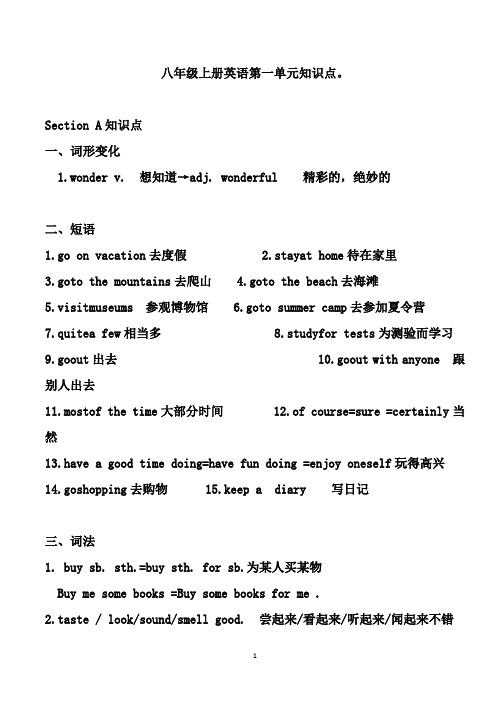
八年级上册英语第一单元知识点。
Section A知识点一、词形变化1.wonder v. 想知道→adj. wonderful 精彩的,绝妙的二、短语1.go on vacation去度假2.stayat home待在家里3.goto the mountains去爬山4.goto the beach去海滩5.visitmuseums 参观博物馆6.goto summer camp去参加夏令营7.quitea few相当多8.studyfor tests为测验而学习9.goout出去10.goout with anyone 跟别人出去11.mostof the time大部分时间12.of course=sure =certainly当然13.have a good time doing=have fun doing =enjoy oneself玩得高兴14.goshopping去购物15.keep a diary 写日记三、词法1. buy sb. sth.=buy sth. for sb.为某人买某物Buy me some books =Buy some books for me .2.taste / look/sound/smell good. 尝起来/看起来/听起来/闻起来不错3.nothing…but+动词原形除了……之外什么都没有I have nothing to dobut watch TV all day .我整天除了看电视什么也没干。
4.seem link v.(系动词) 似乎,好像,看来①seem + adj.②seem to do sth.③It seems that + 陈述句5.Long time no see . 好久不见。
6.提建议的表达方式:①What/ How about + doing sth ? What about going shopping ?②Why don’t you + 动词原形?Whydon’t you go shopping ?③Why not + 动词原形?Whynot go shopping ?④Let’s + 动词原形。
(完整版)八年级上册英语各单元知识点
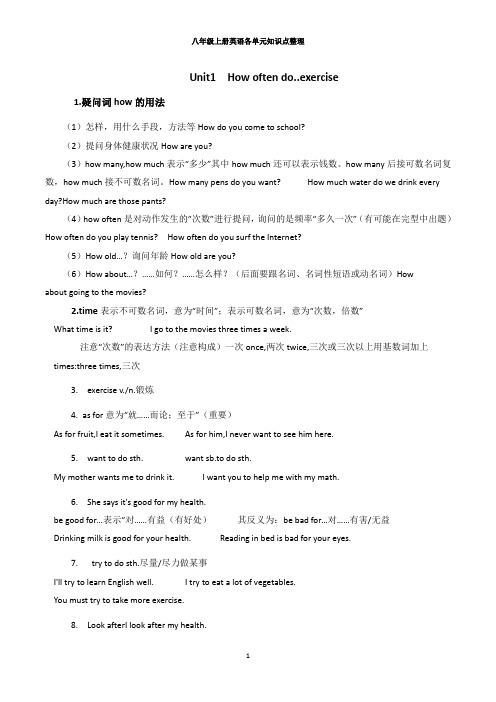
Unit1 How often do..exercise1.疑问词how的用法(1)怎样,用什么手段,方法等How do you come to school?(2)提问身体健康状况How are you?(3)how many,how much表示“多少”其中how much还可以表示钱数。
how many后接可数名词复数,how much接不可数名词。
How many pens do you want? How much water do we drink every day? H ow much are those pants?(4)how often是对动作发生的“次数”进行提问,询问的是频率“多久一次”(有可能在完型中出题)How often do you play tennis? How often do you surf the Internet?(5)How old…?询问年龄How old are you?(6)How about…?……如何?……怎么样?(后面要跟名词、名词性短语或动名词)Howabout going to the movies?2.time表示不可数名词,意为“时间”;表示可数名词,意为“次数,倍数”What time is it? I go to the movies three times a week.注意“次数”的表达方法(注意构成)一次once,两次twice,三次或三次以上用基数词加上times:three times,三次3. exercise v./n.锻炼4. as for意为“就……而论;至于”(重要)As for fruit,I eat it sometimes. As for him,I never want to see him here.5. want to do sth. want sb.to do sth.My mother wants me to drink it. I want you to help me with my math.6. She says it's good for my health.be good for…表示“对……有益(有好处)其反义为:be bad for…对……有害/无益Drinking milk is good for your health. Reading in bed is bad for your eyes.7. try to do sth.尽量/尽力做某事I'll try to learn English well. I try to eat a lot of vegetables.You must try to take more exercise.8. Look afterI look after my health.My brother is ill. I have to look after him today.He often helps his mother look after his little sister.9. help sb.(to)do sth.帮助某人做某事(to大多都是省略)My healthy lifestyle helps me get good grades. She often helps me learn math.10. the same as…与……一样Is her lifestyle the same as yours or different?She looks the same as her sister.11. I think I'm kind of unhealthy.kind of=a little有点儿(重要短语);a kind of一种12. although=thoughAlthough he's ill,he goes to school on time.13. keep in good health(重点掌握)=keep healthy=stay healthykeep+形容词表示保持某种状态A lot of vegetables help you to keep in good health.Keep quiet!The baby is sleeping. We must keep our classroom clean14. That sounds interesting.look(看起来),sound(听起来),smell(闻起来),taste(尝起来),feel(觉得),seem(好象),grow(变得),get(变得)等词在英语中可用作系动词,后跟形容词作表语。
八年级上册英语第一单元知识点汇总
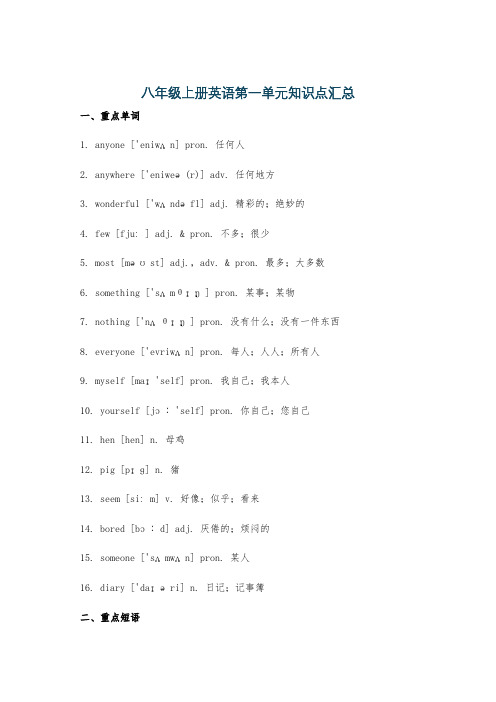
八年级上册英语第一单元知识点汇总一、重点单词1. anyone ['eniwʌn] pron. 任何人2. anywhere ['eniweə(r)] adv. 任何地方3. wonderful ['wʌndəfl] adj. 精彩的;绝妙的4. few [fjuː] adj. & pron. 不多;很少5. most [məʊst] adj.,adv. & pron. 最多;大多数6. something ['sʌmθɪŋ] pron. 某事;某物7. nothing ['nʌθɪŋ] pron. 没有什么;没有一件东西8. everyone ['evriwʌn] pron. 每人;人人;所有人9. myself [maɪ'self] pron. 我自己;我本人10. yourself [jɔː'self] pron. 你自己;您自己11. hen [hen] n. 母鸡12. pig [pɪɡ] n. 猪13. seem [siːm] v. 好像;似乎;看来14. bored [bɔːd] adj. 厌倦的;烦闷的15. someone ['sʌmwʌn] pron. 某人16. diary ['daɪəri] n. 日记;记事簿二、重点短语1. go on vacation 去度假2. stay at home 待在家里3. go to the mountains 去爬山4. go to the beach 去海滩5. visit museums 参观博物馆6. go to summer camp 去参加夏令营7. quite a few 相当多;不少8. study for tests 为考试而学习9. go out 出去10. most of the time 大部分时间11. taste good 尝起来不错12. have a good time 玩得开心13. of course 当然;自然14. feel like 给……的感觉;感受到15. go shopping 去购物16. in the past 在过去17. walk around 四处走走18. because of 因为19. one bowl of... 一碗……20. the next day 第二天三、重点句型1. —Where did you go on vacation? 你去哪儿度假了?—I went to New York City. 我去纽约市了。
英语八年级上册1~3单元知识点

英语八年级上册1~3单元知识点一、单元一:Hello !1. 问候和自我介绍1.1 问候语在日常交流中,问候是非常基础而且重要的部分,例如:Hello!Hi!Good morning/afternoon/evening!1.2 自我介绍当你第一次见到某人时,你需要用英语介绍自己,包括自己的尊称、芳龄、爱好等信息。
例如: My name is Tom. I'm 14 years old. Ilike playing basketball and listening to music.2. 询问及回答2.1 询问对方的尊称和芳龄询问对方的尊称和芳龄是交流中的基本内容,例如:What's your name? How old are you?2.2 回答询问当他人询问你尊称和芳龄时,你需要会做简单而又礼貌的回答,例如:My name is Lily. I'm 13 years old.3. 介绍自己的朋友3.1 描述外貌在介绍朋友时,需要用英语描述对方的外貌特征,例如:He has short black h本人r and big blue eyes.3.2 描述性格和爱好介绍朋友的性格及爱好也是非常重要的部分,例如:She is outgoing and she likes singing and dancing.二、单元二:My Day1. 时间表及日常活动1.1 表述时间在日常生活中,我们需要学会用英语表达时间,例如:It's seven o'clock. It's time for breakfast.1.2 描述日常活动描述日常活动是非常重要的,通过用英语描述,可以让对方更好地了解你的生活,例如:I get up at six thirty in the morning.2. 描述一天的安排2.1 早上在英语中,描述早上的活动需要用适当的词汇和句子结构,例如:In the morning, I usually have breakfast at seven o'clock.2.2 中午描述中午的安排也需要合适的表述方式,例如:At noon, I have lunch with my classmates.2.3 下午形容下午的活动也需要用英语来描述,例如:In the afternoon, I play basketball with my friends after school.3. 时间状语及延续性动词3.1 时间状语在描述一天的安排时,时间状语能让你的描述更加清晰和连贯,例如:At eight in the evening, I do my homework.3.2 延续性动词在描述日常活动时,延续性动词的使用极为重要,能够更准确地表达你的日常习惯,例如:I'm reading a book at the moment.三、单元三:At Home1. 家庭成员及家庭关系1.1 家庭成员描述家庭成员时,需要用英语进行表述,例如:My mother is a teacher and my father is a doctor.1.2 家庭关系通过用英语描述家庭成员之间的关系,能够更好地展现出你的家庭情况,例如:My parents are very kind to me and my sister.2. 描述家中的布置2.1 房间及家具通过用英语描述家中的布置,能够让对方更好地了解你的家庭环境,例如:There is a bed, a desk and a ch本人r in my room.2.2 家居摆设描述家居摆设也是非常关键,通过合适的表述,可以给对方留下深刻的印象,例如:There are some photos on the wall and some plants on the table.3. 家庭活动及家务3.1 家庭活动描述家庭活动时需要用英语进行表述,例如:We often watch TV together on weekends.3.2 家务描述家务活动同样需要用合适的方式表述,例如:I help my mom with the cooking every evening.以上是英语八年级上册1~3单元的部分知识点,希望同学们能够认真学习,掌握这些知识,提高英语的表达能力。
八年级上册英语第一单元知识点笔记
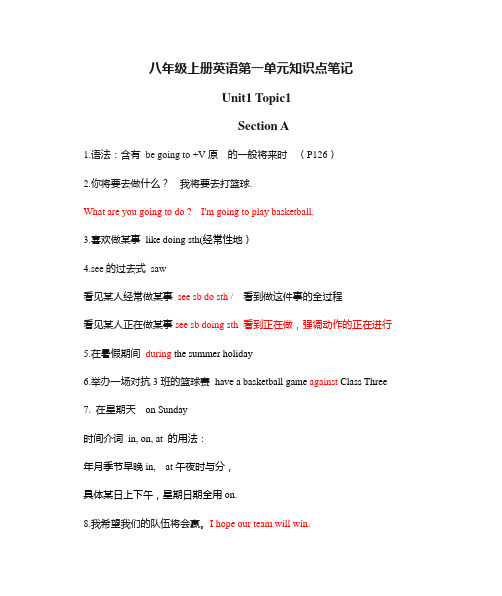
八年级上册英语第一单元知识点笔记Unit1 Topic1Section A1.语法:含有be going to +V原的一般将来时(P126)2.你将要去做什么?我将要去打篮球.What are you going to do ? I'm going to play basketball.3.喜欢做某事like doing sth(经常性地)4.see的过去式saw看见某人经常做某事see sb do sth /看到做这件事的全过程看见某人正在做某事see sb doing sth 看到正在做,强调动作的正在进行5.在暑假期间during the summer holiday6.举办一场对抗3班的篮球赛have a basketball game against Class Three7. 在星期天on Sunday时间介词in, on, at 的用法:年月季节早晚in, at午夜时与分,具体某日上下午,星期日期全用on.8.我希望我们的队伍将会赢。
I hope our team will win.我也是. Me, too.9.你愿意来为我们加油吗?Would you like to come and cheer us on?当然,我愿意Sure,I'd love to.cheer sb on ( sb用的是人称的宾格, 因为跟在动词后)10. 你更喜欢哪一种运动,A or B ?Which sport do you prefer,A or B?11. prefer的用法(1) prefer + 名词= like +名词+ better如:I prefer apples = I like apples better(2) prefer A to B (和B比起来更喜欢A )(3) prefer doing sth更喜欢做某事(4) prefer doing sth to doing sth和做某事比起来,更喜欢做某事(更喜欢前面的,即prefer 后紧跟的动作)(5) prefer to do sth rather than do sth和做某事比起来,更喜欢做某事(更喜欢前面的,即prefer 后紧跟的动作)12. 你划船多吗? 是的,非常多/ 不,很少。
八上英语第一单元语法知识点

八上英语第一单元语法知识点
一、动词时态:
1、一般现在时:表示经常性或习惯性的动作,一般事实或真理,常
与表示频度的时间状语连用。
2、一般过去时:表示过去发生的动作或存在的状态,与表示过去的
时间状语连用。
3、现在进行时:表示正在进行的动作,与表示现在的时间状语连用。
4、一般将来时:表示将来发生的动作,与表示将来的时间状语连用。
5、过去将来时:表示过去将来发生的动作,与表示过去将来的时间
状语连用。
二、情态动词:
1、can(能力):表示“能够、会”的意思。
2、could(能力):表示“能够、会”的意思,多指过去的能力。
3、may(允许):表示“许可、可以”的意思,客观上的可能性。
4、might(允许):表示“许可、可以”的意思,指主观上的可能性。
5、must(必须):表示“必须、应该”的意思,说话者的强烈要求
或主观的义务。
6、should(应该):表示“应该”的意思,提出建议或劝告。
7、shall(意愿):表示“愿意”的意思,说话者的主观意愿或提出
建议。
三、动词的变化:
1、动词的变化有两种:规则变化和不规则变化。
2、规则变化:一般以-ed结尾,如:look—looked;walk—walked。
3、不规则变化:三个部分:人称变化、时态变化和语态变化,如:go—went—gone;draw—drew—drawn。
八年级上册英语第一单元语法知识点
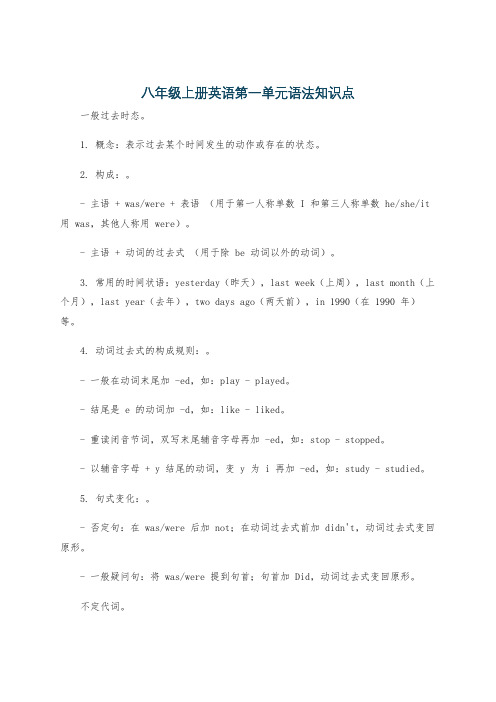
八年级上册英语第一单元语法知识点一般过去时态。
1. 概念:表示过去某个时间发生的动作或存在的状态。
2. 构成:。
- 主语 + was/were + 表语(用于第一人称单数 I 和第三人称单数 he/she/it 用 was,其他人称用 were)。
- 主语 + 动词的过去式(用于除 be 动词以外的动词)。
3. 常用的时间状语:yesterday(昨天),last week(上周),last month(上个月),last year(去年),two days ago(两天前),in 1990(在 1990 年)等。
4. 动词过去式的构成规则:。
- 一般在动词末尾加 -ed,如:play - played。
- 结尾是 e 的动词加 -d,如:like - liked。
- 重读闭音节词,双写末尾辅音字母再加 -ed,如:stop - stopped。
- 以辅音字母 + y 结尾的动词,变 y 为 i 再加 -ed,如:study - studied。
5. 句式变化:。
- 否定句:在 was/were 后加 not;在动词过去式前加 didn't,动词过去式变回原形。
- 一般疑问句:将 was/were 提到句首;句首加 Did,动词过去式变回原形。
不定代词。
1. some 和 any 的用法:。
- some 常用于肯定句中,any 常用于否定句和疑问句中。
- 但在表示请求、建议或希望得到肯定回答的疑问句中用 some。
2. few,a few,little,a little 的区别:。
- few 和 a few 修饰可数名词,few 表示“几乎没有”,a few 表示“一些”。
- little 和 a little 修饰不可数名词,little 表示“几乎没有”,a little 表示“一些”。
复合不定代词。
1. 常见的复合不定代词:something,anything,nothing,everything,someone,anyone,no one,everyone 等。
八年级上册英语重点知识点

八年级上册英语重点知识点英语重点学问点一、重点短语1. on time2. best wishes3. give a talk4. for example5. short for6. a waste of time7. go on a field trip8. go fishing9. I agree10. next week11. the day after tomorrow12. have a picnic13. have some problems doing sth.14. go the wrong way15. hurry up16. get together17. in the open air18. on Mid-Autumn Day19. come over20. have to21. get home22. agree with23. in the country24. in town25. all the same26. in front of27. on the left/right side28. next to29. up and down30. keep healthy31. grow up32. at the same time33. the day before yesterday35. last Saturday36. half an hour ago37. a moment ago38. just now39. by the way40. all the time41. at first二. 重要句型1. have fun doing sth.2. Why dont you?3. Were going to do sth.4. start with sth.5. Why not?6. Are you going to?7. be friendly to sb.8. Youd better do sth.9. ask sb. for sth.10. say goodbye to sb.11. Good luck(with sb)!三. 交际用语1.Welcome backto school!2.Excuse me. Im sorry Im late, because the traffic is bad.3.It doesnt matter.4.Happy Teachers Day !5.Thats a good idea.6.What are you going to do?7.Where are we going ?8.What are we going to do ?9.Im good at10.Its not far from11. Are you free tomorrow evening?12.Would you and Lily like to come over to my home for Mid-Autumn Festival?13.Im glad you can come.14.Thanks for asking us.15.How about another one?16.May I have a taste?17.Let me walk with you.18.What do you have to do?19.Do you live on a farm?20.Which do you like better, the city or the country?21.Which do you like best, dogs, cats or chickens?22.Shall we go at ten? Good idea!23.---Lets make it half past one. ---OK.24.---Why not come a little earlier? ---All right.25.Excuse me. Wheres the nearest post office, please?26.Its over there on the right.27.Im sorry I dont know.28.Youd better29.Thank you all the same.30.Which bus do I take?31.Go along this road.32.What day was it yesterday?33.Im sorry to hear that.34.I hope youre better now.35.Why did you call me?36.I called to tell四. 重要语法1.be going to的用法;2.形容词的比拟级、最高级;3.形容词和副词的比拟4.一般过去时五.重要学问点讲解1. on the street / in the street表示在街上时,on the street 和in the street 都可以,在美国多用on the street, 在英国多用in the street. 例如:We have a house in the street. 我们在街上有座房子。
- 1、下载文档前请自行甄别文档内容的完整性,平台不提供额外的编辑、内容补充、找答案等附加服务。
- 2、"仅部分预览"的文档,不可在线预览部分如存在完整性等问题,可反馈申请退款(可完整预览的文档不适用该条件!)。
- 3、如文档侵犯您的权益,请联系客服反馈,我们会尽快为您处理(人工客服工作时间:9:00-18:30)。
2013人教版八上英语知识点Unit4 What’s the best movie theater?一1.movie theater电影院2.close to…离……近3.clothes store服装店4.in town在镇上5.so far到目前为止6.10 minutes by bus坐公共汽车10分钟的路程7.talent show才艺表演8.in common共同;共有9.around the world世界各地;全世界10.more and more……越来越……11.and so on等等12.all kinds of……各种各样的13.be up to是……的职责;由……决定14.not everybody并不是每个人15.make up编造(故事、谎言等)16.play a role in…在……方面发挥作用/有影响17.for example例如18.take…seriously认真对待19.give sb. sth.=give sth. to sb.给某人某物e true=come into reality(梦想、希望)实现;达到21.the biggest screens最大的荧屏22.be the closest to home 离家最近23.the shortest waiting time 最短的等候时间24.have the most comfortable seats 有最舒服的座位25.the best sound 最好的声音26.buy clothes the most cheaply 买最便宜的衣服27.play the most boring songs播放最乏味的歌曲28.the worst music 最差的音乐29.the freshest food最新鲜的食物30.sit the most comfortably 坐得最舒服31.the best performer 最好的演员32.the most talented person 最有天赋的人33.more and more popular 越来越受欢迎34.have...in common 有相同特征35.the funniest actors 最风趣的演员36.play the piano the best 钢琴弹得最好37.sing the most beautifully 唱得最美妙38.around 10 o’clock 大约十点39.China’s Got Talent 中国达人秀二、1.Can I ask you some…?我能问你一些……吗?如:Can I ask you some questions? (some用在疑问句中表示委婉语气、建议,不能换成any)2.How do you like…? =What do you think of…?你认为……怎么样?如:How do you like it so far? =What do you think of it so far?到目前为止你认为它怎么样?3.Thanks for doing sth.因做某事而感谢。
如:Thanks for telling me. 谢谢你告诉我。
4. the +序数词+形容词最高级+可数名词单数.“第几…的…”如:He is the second tallest boy in the class.5.much+ adj./adv.的比较级“……得多”,即much可以修饰比较级。
如:He is much better than other actors at finding the most interesting roles.他比其他演员更擅长找到最有趣的角色。
6.watch sb. do sth.观看某人做某事如:It’s always interesting to watch o ther people show their talents.观看别人展示他们的天赋总是很有趣。
7.play a role in doing sth.发挥做某事的作用/在做某事方面扮演重要的角色如:When people watch the show,they usually play a role in deciding the winner.当人们观看表演时,他们通常在决定冠军方面发挥作用。
8. one of the +最高级+可数名词复数(意为“最...之一”,做主语时看做单数)如:One of the longest rivers in China is the Yellow River.注意:“one of +形容词性物主代词/名词所有格+可数名词复数”=“a/an +可数名词单数+of+名词性物主代词/名词所有格”如:one of my friends=a friend of mine我的一个朋友如:one of the boy’s habits=a habit of the boy’s这个男孩的一个习惯9.形容词最高级与比较级的转换,变成:①形容词比较级+than any other +单数名词②形容词比较级+than the other + 复数名词③形容词比较级+than anyone else如:Mike gets to school earlier than any other student in his class.= Mike gets to school earlier than any of the other students in his class.= Mike gets to school earlier than the other students in his class.= Mike gets to school earlier than anyone else in his class.= Mike gets to school earliest in his class.注意:Mike gets to school earlier than any student in Tom's class.三、重点单词用法1. comfortable adj. 舒适的,舒服的,安逸的比较级:more comfortable 最高级:the most comfortable副词:comfortably反义词:uncomfortable2. seat ①n. 座位take a seat = have a seat 坐下take one’s seat 就座如:Have a seat ,please. 请坐There are enough seats in the meeting-room.(会议室)②vt. 及物动词,be seated 就座=seat oneself如:He seated himself comfortably on his chair. They are seated there.注意:seat/sit(从动词角度上区别)共同点:作为动词,都可以表示“坐”的意思。
不同点:①seat是及物动词,比较正式,常以被动形式表示主动意义,seat sb / oneself=be seated,主语可以是人可以是物。
如:He is seated between Jack and Tom.她坐在杰克和汤姆之间。
Please be seated. (=Please seat yourself.) 请坐。
He seated himself at the desk.他坐在做桌子旁。
The room can seat forty people.房间可以容纳40个人的座位。
②sit通常作不及物动词用,比较口语化,主语通常是人。
如:The students are sitting at their desks.学生们正坐在课桌旁。
Sit down, please. 请坐。
另外,注意这两个词在作宾补时的不同形式:When I came in I found him seated/sitting at the back.3. sound①n. 声音,指自然界的一切声音注意:sound/ voice/ noisevoice人的“嗓音”。
noise不悦耳的噪音sound指自然界的一切声音②v. 作为连系动词sound + 形容词,意为“听起来……”如:The story sounds interesting.4. close ①adj. 近的(指时间或空间上的),亲密的②v. 关闭be close to… 离…近be far from… 离… 远如:My home is very close to the school.You are my close friend.你是我最亲密的朋友。
Please close the door.注意:closed adj. 关着的其反义词:open如:The door is closed.门是关着的。
5. ticket n. 票,券 a ticket to/ for sth. 一张…的票相似地:a key to the door 门的钥匙;the way to… 去某地的路如:在回家的路上on the way home 一张去动物园的票a ticket to the zoo6.wait vi.不及物动词wait for sb./sth. 等待某人/某物can’t wait to do sth. 迫不及待做某事如:He is waiting for a bus他正在等公交车She is waiting for you at the bus station.她正在公交车站等你。
I can't wait to open that box, wondering what's inside. 我迫不及待地打开那个盒子,想看看里面是什么.注意:waiting time 等候时间动词的-ing形式作定语,修饰名词,表示被修饰词的某种用途。
类似地:read-ing + room阅读房间= reading room 阅览室swim-ming + pool游泳水池= swimming pool 游泳池7. choose v. 选择,挑选①过去式:chose ;过去分词:chosenchoose (not) to do sth. 决定(不)做某事如:He chose not to go to the park.他决定不去公园了。
②其名词:choice“选择”make a choice 做选择have no choice but to do sth.=have nothing but do sth. 除了做…外别无他法/选择如:He has no choice but to stay at home.他只能呆在家里。
